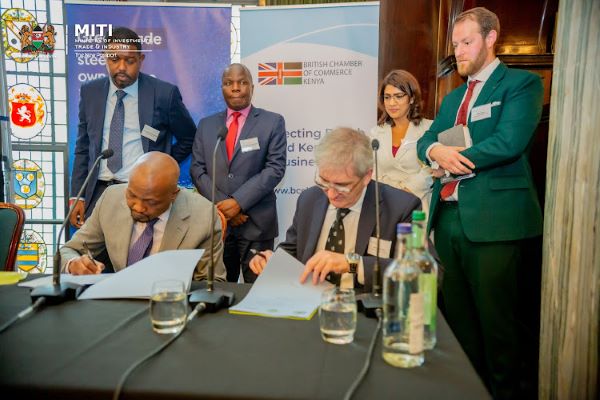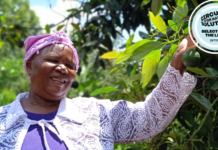
Kenya is set to benefit $200m (around Ksh26 billion) deal with UK to improve farming among the rural communities and reduce the country’s dependence on food imports, thus decreasing Kenya’s trade deficit.
The deal between Kenya and British-based investment group United Green Group (UG) will see the group deliver Agri-fin-tech services for rural communities, high-productivity climate-smart farming and state-of-the-art agro-industrial facilities over the next five years.
“We are very grateful for the investment which will support the Kenyan Government’s strong commitment to agricultural transformation, increased productivity and output, and inclusive growth of local agriculture and associated industries,” said Mr. Moses Kuria, Kenya’s Trade Cabinet Secretary.
According to the agreement, United Green Group will deliver its mandate of adopting a rigorous development in agriculture targeted at contributing materially to food security around Lake Victoria region in a local joint venture with Kenyan company Victoria Green Invest.
“We are proud to have found such committed foundation partners and identified potential additional partnerships with international DFI’s and look forward to building a national champion business in the sector together,” said Albrecht Frischenschlager, UG’s chief investment officer.
High-value crops
It is expected that the targeted high-value crops such as rice, cotton, sunflower, soybean and maize will generate foreign exchange with a focus on feeding local consumer and industry demand with consumer value addition done within Kenya.
The value addition includes at least 100,000 tonnes (16 per cent of local demand) for locally produced rice products and another 100,000 bales (160 per cent of current local production) equivalent of cotton products to support the Kenyan textile industry.
The deal was signed between Mr Kuria, Frischenschlager and Kisumu County Governor, Prof Peter Anyang’ Nyong’o.
According to Nyong’o Kenya needs a champion organisation to provide leadership and prudent investment to develop inclusive, scalable, market-based, environmentally sustainable and high-productivity agri-food systems.
“This project has an incredible alignment to the Kisumu’s strategy and with the national Government’s Agricultural Sector Transformation and Growth Strategy 2019-2029, we will significantly contribute to all nine ASTGS flagships,” he said.
Frischenschlager said the investment would not have been possible without market orientation, business process guidance and support from the UK Government.
He singled out the the invaluable support from the British High Commission in Kenya, Agricultural Transformation Office and Ministry of Investments, Trade and Industry, Kenya.
Kuria said that he is ready to support the programme and is confident of the expected positive outcomes that include job creation, improved crop production for the outgrower community and enhanced livelihoods could be extended across Kenya.
Kenya’s food import bill
The latest data from the Kenya National Bureau of Statistics (KNBS) shows that Kenya’s food import bill rose 18 percent to Sh183.93 billion in nine months from Sh155.42 in a corresponding period in 2021.
This is the highest figure recorded in a year’s first nine months since 2017 when the bill stood at Sh185.22 billion pointing to heightened food imports during the election period.








